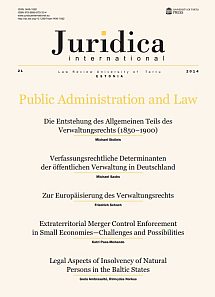On the Situation of Law-enforcement Law in Estonia
DOI:
https://doi.org/10.12697/JI.2014.21.08Keywords:
law-enforcement legislation, threat-control legislation, threat-prevention legislation, police law, administrative lawAbstract
The article addresses the situation of the Estonian law-enforcement legislation in relation to the ongoing legislative reform in the associated field. On 23 February 2011, the Parliament of Estonia adopted the Law Enforcement Act, on which the new Estonian law-enforcement legislation shall be based. That act has its foundation in the idea of preventive maintenance of public order, and the core threshold set for implementation of measures restricting fundamental rights is linked to the concept of (specific) threat.
Selection of suitable law-enforcement legislation concepts has been accompanied by serious doubts. The author addresses several dispute-laden issues, such as the possible scope for delegation of public-law enforcement tasks to private persons, the legal-cultural suitability of a law-enforcement model that is based on the concept of threat as part of our legal order, the issue of ensuring optimal balance between repression and prevention, and the compliance of several aspects of threat-control legislation with the Constitution – especially with its principles of legal clarity and proportionality.


